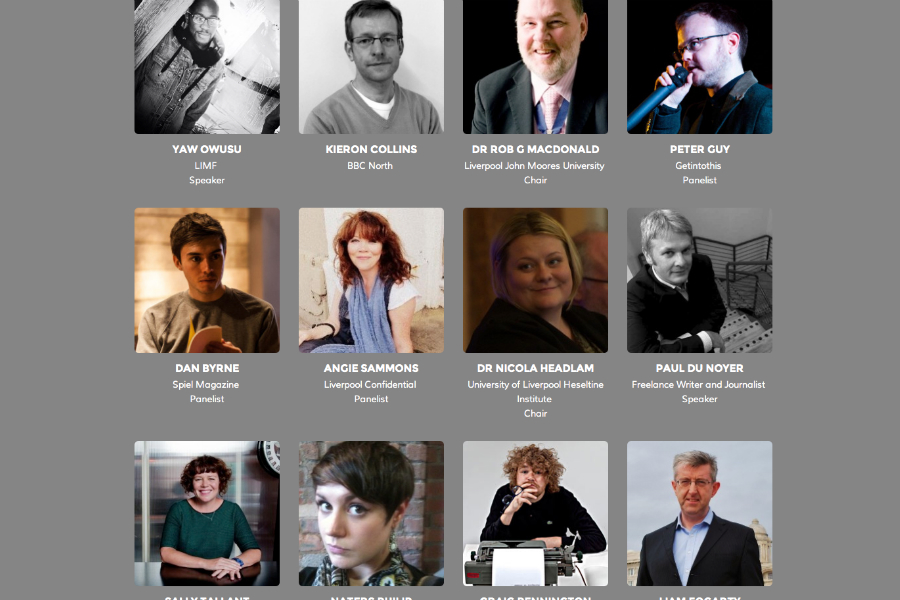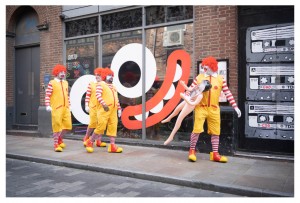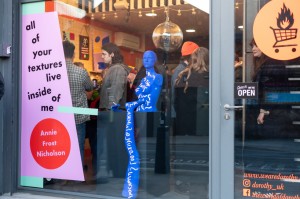Liverpool X — Reviewed

Jon Davies heads down to Liverpool’s latest creative forum and wonders whether we are more detached from culture than ever…
If there was one activity that could encapsulate Liverpool’s arts and culture community this year it would be its proliferation of talks and open forums. Predominantly Static Gallery’s discussion on its Noise Abatement notice, Bido Lito!/Fallout Factory’s Culture Forum, and the SevenStreets-inspired Facebook threads, have all been fascinating, yet at times maddening, due to their ‘all talk but little action’ conclusions. Liverpool X‘s day of ‘exhaustive debate’ and ‘exquisite ideas’ at the Baltic Triangle last Wednesday almost seemed like a good place to finish this year of soul searching, and just get on with putting the city where it wants to be.
Billed as a ‘transformative, world changing… event about identity, practical creativity and entrepreneurialism’, the panel discussions and keynote speeches were designed to give its audience a glimpse into the future of the city through planning, policy, and honest reflection. It quickly became apparent, however, that the day’s worth of speakers would not be representing a fair balance of Liverpool residents, artists and entrepreneurs. Observed in both the first and second panels was the lack of equality in regards to gender and ethnicity; according to a representative of the event this was not for the want of trying, rather it was the lack of confidence to speak in a predominantly white male forum. If Liverpool X is to continue in the future, it is imperative that all aspects of the city can be represented, as it feels all too often that places like the Baltic Triangle only serve the purpose of a wealthy and well educated few.
Throughout the generally informal discourse there was an underlying sense of history, empowerment, and introspection. One of the highlights of the day was author and architect Stephen Bayley, who claimed that Liverpool was the first city in the UK to have died, and it was up to the citizens of Liverpool to redevelop its own attitude, since its death cultivated a level of introspection that became a mental block for applying itself in a practical way. During Paul DuNoyer’s panel, ’A Wondrous Future?’, Miles Falkingham (FVMA architects, Camp and Furnace), believed that the media had instigated a narrative that Liverpool didn’t need to talk to the rest of the UK. Dave Pichilingi (Sound City) announced his love for brashness and arrogance in order to talk the city up. Local historian Laurence Westgaph, during ‘Has the city of radicals lost its edge?’, focused his argument on Toxteth, suggesting the city had never been able to empower its only multicultural community, which in turn allowed Liverpool 8 to be characterised by drug and poverty problems.
As someone who grew up in a multicultural suburb this rang very true; whereas other UK cities like London, Birmingham and Manchester have been able to embrace ethnic diversity, Liverpool could certainly benefit with opening itself up and welcoming in a wider scope of ‘Scouseness’.
The idea of Scouseness, and its potential to evolve, might not have been pushed to the forefront of Liverpool X’s agenda, but the concept was alluded to on many occasions. Is the notion of being Scouse an untouchable abstract? Does Liverpool have to be the butt of every hubcap robbing, jangly guitar pop, curly haired, bronzed and browed, football-obsessed joke in Britain? Taking Manchester as an example, DuNoyer’s panel believed that the idea of being a Mancunian had been lost due to its desires of becoming England’s second city. Despite this, Manchester to me still boasts a more open identity, one that doesn’t get hung up with stereotypes as much as its north-west neighbour.
For Liverpool X’s arguably most arts-oriented discussion, ‘Are we a city that makes culture or do we merely stage it?’, it felt as though each panel member had their own agenda before any sort of discussion was attempted. Chaired by Bido Lito’s Craig Pennington, the discussions were mostly dominated by himself, Dave Pichilingi and Liverpool Biennial artistic director Sally Tallant, with too much of a music focus. It was a shame, since more interesting views from The Royal Standard’s Amy Jones and Liverpool International Music Festival’s Yaw Owusu were subdued, whilst Liverpool Daily Post journalist Peter Guy was only really given platform to talk about his Get Into This (GIT) Awards, instead of the wider scope covered on a daily basis by his influential blog.
There was an impression that while individuals like Guy and Tallant were attempting to draw honest conclusions about Liverpool’s grassroots scene, for me it was overshadowed by Pichilingi’s ramblings about his work at Sound City and Baltic Records. In addition, Pichilingi’s natural refusal of discussion or critique was exacerbated by his arrogant championing of Liverpool’s music scene; most of us know that whilst the city does produce some real gems, we’re mostly treated to hackneyed genre revivals with little relation to the broader international scene.
Did Liverpool X resolve any issues around isolation and introspection? One controversial, but positive, outcome was to work with ‘our neighbours over there’, Manchester, more closely. The idea is noble, building a stronger transport network between the two cities, breaking down the cultural barrier, and treating the north-west as a large metropolitan area. But whereas Liverpool spends most of its time aggrandising itself to itself, Manchester is taking action, and is seen by outsiders as a cultural destination of the north for modern culture.
The city’’s creative spirit on display at Liverpool X seemed to only extend to those with money on their mind: it kept nagging me that the site of the event, the Baltic Triangle, is currently the crown in Liverpool’s entrepreneurial mentality, but also a spectre of Toxteth’s plight, despite being a rich source of culture and history for the city over the past 30 years. I may be naive in thinking that culture is best created without the idea of money, and through a desire to exist on one’s own terms, but this was why I found Liverpool X a little detached from culture itself.
For an event that nobly attempted to display the city’s maturity, it felt like there’s still a long way to go in exporting ‘Team Liverpool’.
Jon Davies
Read more…
Kenn Taylor’s considered look at what an increasing commodification of culture means to a city: What Price Culture?
Gareth Woollam looks at the implications of policy on culture… Sound Effects
Jon Davies predicts graduates will vote with their feet, himself included… Static Fallout: Another Reason To Leave Liverpool
We consider the aftermath as another live music venue bites the dust… Capital of Culture? Ask Static Gallery





